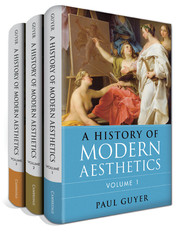Book contents
- Volume 1 The Eighteenth Century
- Volume 2 The Nineteenth Century
- Volume 3 The Twentieth Century
- Frontmatter
- Contents
- Acknowledgments
- Introduction
- Part One German Aesthetics in the Twentieth Century
- Part Two Aesthetics in Britain until World War II
- 3 Bloomsbury, Croce, and Bullough
- 4 First Responses to Croce
- 5 Collingwood
- Part Three American Aesthetics in the First Half of the Twentieth Century
- Part Four Wittgenstein and After
- Bibliography
- References
5 - Collingwood
from Part Two - Aesthetics in Britain until World War II
Published online by Cambridge University Press: 05 June 2015
- Volume 1 The Eighteenth Century
- Volume 2 The Nineteenth Century
- Volume 3 The Twentieth Century
- Frontmatter
- Contents
- Acknowledgments
- Introduction
- Part One German Aesthetics in the Twentieth Century
- Part Two Aesthetics in Britain until World War II
- 3 Bloomsbury, Croce, and Bullough
- 4 First Responses to Croce
- 5 Collingwood
- Part Three American Aesthetics in the First Half of the Twentieth Century
- Part Four Wittgenstein and After
- Bibliography
- References
Summary
Let us now turn to the aesthetics of R.G. Collingwood. His chief work, The Principles of Art, appeared five years after Alexander’s book on beauty and at least begins as a riposte to it on behalf of Croce: In particular, Collingwood’s insistence upon the distinction between craft and art can be considered as a rebuttal of Alexander’s suggestion of more of a continuum from craft to art and of a large element of craft in all art. The Principles of Art also begins with a strongly cognitivist conception of art, in apparent contrast to any recognition of the importance of emotional impact in the experience of art as well as the recognition of any element of play in aesthetic creation and experience. A view of Collingwood’s work in aesthetics beyond Book I of the Principles, however, suggests a more complicated picture. Collingwood’s writings on aesthetics from the 1920s reveal a commitment to the centrality of imagination in art that may connect him to the tradition of play as well as to the cognitivist tradition in aesthetics, and the later books of the Principles make it clear not only that emotion is the central subject of aesthetic cognition but also that its actual experience is a necessary condition for its cognition. At the end of Book I, the Principles also introduces a conception of the “Total Imaginative Activity” that seems to connect Collingwood to the aesthetics of play. Further, in both Collingwood’s earlier work and the final book of the Principles work we may find a more complicated position on the relation between idea and materiality of art than Croce held and with which the Principles begins, one closer to the position of Croce’s critics than to Croce’s own.
- Type
- Chapter
- Information
- A History of Modern Aesthetics , pp. 189 - 234Publisher: Cambridge University PressPrint publication year: 2014



